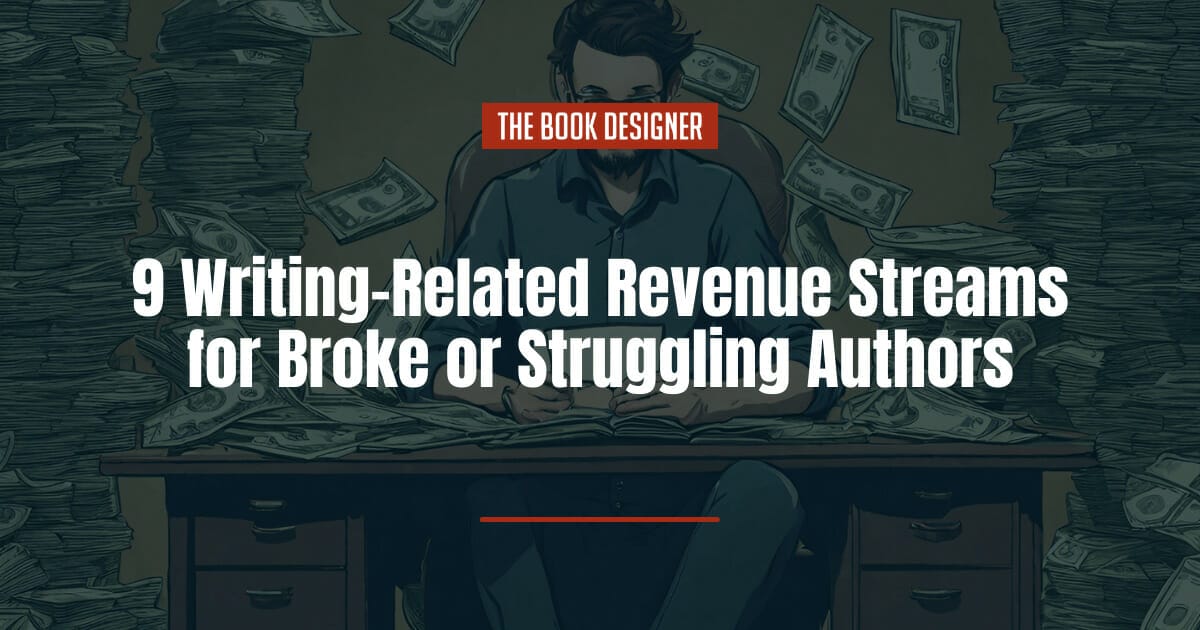When the Authors Guild released results of its most recent survey showing that writing-related revenue activity from all sources in 2017 was down significantly, I wasn’t surprised.
What the Guild calls “the largest survey of U.S. professional writers ever conducted” showed the median income that published American authors received for all writing-related activity in 2017 was $6,080, down from $10,500 in the survey taken only two years before.
The survey also showed that the median income for book-related income for published authors declined by one-fifth, from $3,900 in 2013 to $3,100 in 2017.
Why such grim figures?
My guess is that because Amazon makes it so easy for anyone to become an author, the marketplace is swollen with competition for readers’ time and money.
I’ve always counseled my author clients to create writing-related revenue streams beyond their books. Print books, in particular, suck up money like a vacuum cleaner, with most of it spent on editing, printing, cover design, interior formatting, marketing, and publicity.
How, then, can authors create more revenue streams associated with their books or areas of expertise without incurring a lot of additional expense? Here are nine of my favorite ways to make money other than writing books.
Here are some excellent writing-related revenue streams authors can explore:
1. Special Reports
A special report is a PDF of five to seven pages devoted to a narrow topic.
I started writing them about two decades ago when I decided to write a book on how to generate free publicity. But I knew that books are money pits. I wanted to sell each chapter as soon as it was written, with the grand plan to publish all 20 or 25 chapters, or reports, into a book when I was done.
Each report sold for only $7 and I promoted them through my weekly email tips. Readers snatched them up as fast as I could write them, often buying four and five at a time!
They proved so successful that I abandoned the idea for the book, kept cranking out the reports and today have 52 special report titles.
Do the math. What’s 52 x $7? How much money would I make if I sold those 52 reports as a book? Maybe $25 max per book?
I update all the reports every few years, sell them individually or in a discounted bundle, and do special promotions once or twice a year. The secret to success with special reports is to choose topics an inch wide, and go a mile deep with the content.
2. Templates
Teach people how to build, write, or create something from a topic that’s tied to your book or expertise.
Nonfiction authors can create templates for:
- websites
- infographics
- business letters
- emails
- quizzes
- resumes
- time management and more
Fiction authors can create templates or patterns for things like:
- Civil War costumes
- templates for love letters
- meditations
- jokes and humor
3. Subscription Newsletters
Charge readers for providing valuable advice via email, on a regular schedule.
Publishing experts Jane Friedman and Porter Anderson write The Hot Sheet, an industry email newsletter for authors that offers context and analysis about complex issues for those who are traditionally published or self-published. Annual subscription is $59.
Subscription newsletters work particularly well for authors who have deep expertise in a narrow topic. Before you start charging, however, offer your tips for free to give people a taste of what they’ll get. Don’t start charging until you’re sure you can maintain a regular publishing schedule. Substack is an easy-to-use subscription newsletter platform that authors should be sure to check out.
4. Adult Education Classes
Contact your local:
- city hall
- tech school
- school district
- college
- university
- career center
If you’ve written a historical novel, you’ve probably done enough research on the time period that you can offer an entire course on it.
Have you written a romance novel and do you know a lot about online dating? I’ll bet that if you taught a course on how to get started on the dating sites, including how to avoid the scammers who rob vulnerable people, especially widows, the class would be filled.
Collect email addresses of your students and, with their permission, put them on your email list so they can receive notices about your publishing news and other events.
5. Online Courses
These can include:
- a digital workbook
- a recorded webinar
- a series of short videos
- an upsell to private coaching in addition to the course
There are a number of platforms out there, such as Teachable, for hosting your own online courses. Although you can also just create an email course and send it out through a service like MailChimp.
6. Private Facebook Groups
Author and public speaker Tom Antion created Screw the Commute, a closed Facebook group that costs $37 a month, or $247 a year for a charter membership.
It’s devoted to tips and tricks for running a home-based business, something he knows well. The multi-million-dollar Internet marketer started working at age 10 and has never worked for anyone other than himself.
Within his private group, members can ask questions about any phase of running a business and Tom answers quickly. He offers a trial 7-day membership for only $1.
These groups are a powerful way to upsell clients into a mentor or coaching program.
7. Rent My Brain Sessions
This is simply known as hourly consulting. But it’s the term I borrowed from someone several years ago.
If you’re thinking, “Why would someone want to rent a fiction author’s brain?” you might be surprised. Maybe they love your dystopian novels and want to write them too, but they have no clue how to get started as an author. Who better to ask for help than you?
Some of the people who find my website through search want advice on topics I never would have considered offering but am qualified to teach.
You can use GotoMeeting like I do. It lets the client see my computer screen. I send a copy of the video afterward so they can review it at their leisure. The video eliminates the need to take notes during the call, leaving them free to concentrate on what I’m teaching.
Or keep it super cheap and super simple. Offer Rent My Brain sessions only by telephone, without a recording.
8. Professional Speaking
Public speakers speak for free. Professional speakers ask for a fee.
Don’t overlook the many paid opportunities at colleges and universities. They need speakers for:
- orientation week
- faculty and staff training
- student leadership training
- student government events
- lectures sponsored by fraternities and sororities
- commencement and graduation
- student conferences
- summer programs
- events for athletes and clubs
Author Patty Hendrickson of Wisconsin, a Certified Speaking Professional, built her career speaking about leadership and other topics at colleges and universities.
9. Writing, Editing and Proofreading
You already know how to do this!
Advertise your writing-related skills on Craigslist or Fiverr.com. Get onto the speaking circuit in your community and teach audiences how to write a simple how-to article for an industry publication. Some people are too busy to learn. So they might hire you to ghostwrite it for them.
You can also buy Facebook ads, advertise on community message boards like NextDoor.com and post flyers at colleges and universities where students might need a writing tutor.
You don’t need four or five of these ideas. Choose one and do it well. When you start making money, choose another, and so on.
What about you? What do you do to bring in additional writing-related revenue without relying only on your book?



